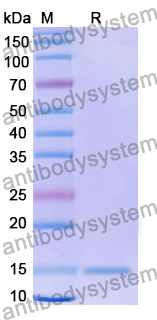Humanized dual-targeting antibody-drug conjugates specific to MET and RON receptors as a pharmaceutical strategy for the treatment of cancers exhibiting phenotypic heterogeneity., PMID:39837982
Nuclear translocation of RON receptor tyrosine kinase. New mechanistic and functional insights., PMID:39794156
Conformational variability in the D2 loop of Plasmodium Apical Membrane antigen 1., PMID:39324028
The Clinical Significance of CD163+ Tumor-Associated Macrophages (TAMs) in Laryngeal Squamous Cell Carcinoma., PMID:37082492
The MSP-RON pathway regulates liver fibrosis through transforming growth factor beta-dependent epithelial-mesenchymal transition., PMID:33786995
MET and RON receptor tyrosine kinases in colorectal adenocarcinoma: molecular features as drug targets and antibody-drug conjugates for therapy., PMID:32962738
Antibody-drug conjugates targeting RON receptor tyrosine kinase as a novel strategy for treatment of triple-negative breast cancer., PMID:32479905
RON receptor tyrosine kinase in pancreatic ductal adenocarcinoma: Pathogenic mechanism in malignancy and pharmaceutical target for therapy., PMID:32234337
Therapeutic efficacy of a novel humanized antibody-drug conjugate recognizing plexin-semaphorin-integrin domain in the RON receptor for targeted cancer therapy., PMID:31519211
Therapeutic anti-cancer activity of antibodies targeting sulfhydryl bond constrained epitopes on unglycosylated RON receptor tyrosine kinase., PMID:31417186
RON and RONΔ160 promote gastric cancer cell proliferation, migration, and adaption to hypoxia via interaction with β-catenin., PMID:31085796
Therapeutic efficacy, pharmacokinetic profiles, and toxicological activities of humanized antibody-drug conjugate Zt/g4-MMAE targeting RON receptor tyrosine kinase for cancer therapy., PMID:30871619
Safety and Tolerability of c-MET Inhibitors in Cancer., PMID:30649748
Antibodies against a Plasmodium falciparum RON12 inhibit merozoite invasion into erythrocytes., PMID:30342119
RON Receptor Tyrosine Kinase as a Therapeutic Target for Eradication of Triple-Negative Breast Cancer: Efficacy of Anti-RON ADC Zt/g4-MMAE., PMID:30275241
Identification of the splice variants of Recepteur d'Origine nantais (RON) in lung cancer cell lines., PMID:30223007
Preclinical Efficacy of Anti-RON Antibody-Drug Conjugate Zt/g4-MMAE for Targeted Therapy of Pancreatic Cancer Overexpressing RON Receptor Tyrosine Kinase., PMID:29944378
The serine/threonine protein kinase of Streptococcus suis serotype 2 affects the ability of the pathogen to penetrate the blood-brain barrier., PMID:29797543
Splice variants of the extracellular region of RON receptor tyrosine kinase in lung cancer cell lines identified by PCR and sequencing., PMID:29121914
Cross-reactivity between apical membrane antgen 1 and rhoptry neck protein 2 in P. vivax and P. falciparum: A structural and binding study., PMID:28817634
Hypoxia-Mediated Mechanisms Associated with Antiangiogenic Treatment Resistance in Glioblastomas., PMID:28284719
Phase 1 study of narnatumab, an anti-RON receptor monoclonal antibody, in patients with advanced solid tumors., PMID:28161886
Monoclonal antibody Zt/g4 targeting RON receptor tyrosine kinase enhances chemosensitivity of bladder cancer cells to Epirubicin by promoting G1/S arrest and apoptosis., PMID:28075465
Strategies of targeting the extracellular domain of RON tyrosine kinase receptor for cancer therapy and drug delivery., PMID:27503093
Characterization of RON protein isoforms in pancreatic cancer: implications for biology and therapeutics., PMID:27323855
Biological evaluation of antibody-maytansinoid conjugates as a strategy of RON targeted drug delivery for treatment of non-small cell lung cancer., PMID:27102688
Protective efficacy of pVAX-RON5p against acute and chronic infections of Toxoplasma gondii in BALB/c mice., PMID:26821295
Cross-arm binding efficiency of an EGFR x c-Met bispecific antibody., PMID:26761634
MET is a predictive factor for late recurrence but not for overall survival of early stage hepatocellular carcinoma., PMID:25874493
Roles of c-Met and RON kinases in tumor progression and their potential as therapeutic targets., PMID:25784650
Involvement of activation of C-met signaling pathway in CD151-induced HUVECs angiogenesis., PMID:25673190
Chrysin inhibits cell invasion by inhibition of Recepteur d'origine Nantais via suppressing early growth response-1 and NF-κB transcription factor activities in gastric cancer cells., PMID:25625479
Human tumor xenografts in mouse as a model for evaluating therapeutic efficacy of monoclonal antibodies or antibody-drug conjugate targeting receptor tyrosine kinases., PMID:25319897
Efficacy of anti-RON antibody Zt/g4-drug maytansinoid conjugation (Anti-RON ADC) as a novel therapeutics for targeted colorectal cancer therapy., PMID:25294907
Hypoxia promotes nuclear translocation and transcriptional function in the oncogenic tyrosine kinase RON., PMID:24903148
The RON receptor tyrosine kinase in pancreatic cancer pathogenesis and its potential implications for future targeted therapies., PMID:24518495
Analyses of interactions between heparin and the apical surface proteins of Plasmodium falciparum., PMID:24212193
Impact of docosahexaenoic acid on gene expression during osteoclastogenesis in vitro--a comprehensive analysis., PMID:23945674
Ron knockdown and Ron monoclonal antibody IMC-RON8 sensitize pancreatic cancer to histone deacetylase inhibitors (HDACi)., PMID:23922886
RON confers lapatinib resistance in HER2-positive breast cancer cells., PMID:23811285
MSP-RON signalling in cancer: pathogenesis and therapeutic potential., PMID:23792360
Receptor tyrosine kinases MET and RON as prognostic factors in diffuse large B-cell lymphoma patients receiving R-CHOP., PMID:23745832
Oncogenic variant RON160 expression in breast cancer and its potential as a therapeutic target by small molecule tyrosine kinase inhibitor., PMID:23597200
The RON receptor tyrosine kinase is a potential therapeutic target in Burkitt lymphoma., PMID:23360784
KRC-327, a selective novel inhibitor of c-Met receptor tyrosine kinase with anticancer activity., PMID:23340177
Crystal structure of the Sema-PSI extracellular domain of human RON receptor tyrosine kinase., PMID:22848655
Peritumoral stromal remodeling, pattern of invasion and expression of c-met/HGF in advanced squamous cell carcinoma of the cervix uteri, FIGO stages III and IV., PMID:22480414
The RON-receptor regulates pancreatic cancer cell migration through phosphorylation-dependent breakdown of the hemidesmosome., PMID:22275185
Sustained expression of the RON receptor tyrosine kinase by pancreatic cancer stem cells as a potential targeting moiety for antibody-directed chemotherapeutics., PMID:22014215
Inhibition of HGF/cMET expression prevents distant recurrence of rectal cancer after preoperative chemoradiotherapy., PMID:21922134

